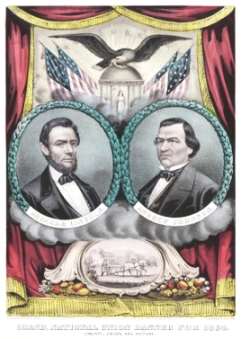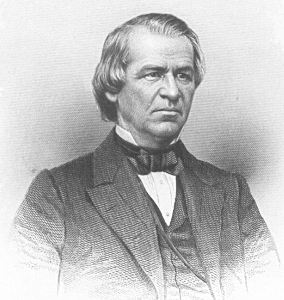“Andy ain’t a drunkard.“
Abraham Lincoln’s Second Inaugural on March 4, 1865 was held on a miserable, windy, rainy, and muddy day in Washington, D.C. The inaugural ceremonies were planned to be held outside, but were moved inside to the Senate chamber because the weather was so bad.
“The inauguration went off very well except that the Vice President Elect was too drunk to perform his duties & disgraced himself & the Senate by making a drunken foolish speech. I was never so mortified in my life, had I been able to find a hole I would have dropped through it out of sight.”
— Senator Zachariah Chandler.
Note: You may read about Abraham Lincoln’s Second Inaugural in this post.
Vice President Hannibal Hamlin was retiring, and Tennessee Democrat Andrew Johnson would now be inaugurated as Abraham Lincoln’s vice-president. The Senate chamber’s 1800s ventilation system was poor and it could not handle the added moisture from the wet and soaked clothes of the people attending the ceremony. The Senate chamber was muggy and sticky, it was a very uncomfortable place to be on this poor-weather inaugural day in Washington, D.C.
Andrew Johnson was in poor health during the weeks before Lincoln’s inaugural. He’d been suffering from typhoid fever, and his travel from Nashville to Washington only added to his physical discomfort and weakness. Now, shortly before the inaugural, Johnson wasn’t feeling well at all, so he downed three glasses of “medicinal” whiskey to prepare himself before entering the uncomfortable Senate chamber. As Andrew Johnson walked into the chamber he appeared to be unsteady, and he was leaning on Hannibal Hamlin’s arm.Usually the vice-president’s inaugural speech is a brief formality on inauguration day. It became obvious to all that the new vice-president was three sheets to the wind as he began his vice-presidential inauguration speech. The stewed Johnson rambled on and on, speaking for seventeen minutes instead of the expected seven. Hannibal Hamlin finally gave a tug on Johnson’s coat-tail, only then did Johnson end his alcohol-impaired inaugural speech.
Andrew Johnson’s sottish inauguration festivities and formalities were not yet complete. As he took the oath of office (which took more time than needed, because Johnson drunkenly rambled with incoherent and slurred speech), Johnson put his hand on the Bible and said in a loud voice; “I kiss this Book in the face of my nation the United States.“
Johnson then gave the Bible a tipsy kiss. As the now freshly inaugurated vice-president, it was Johnson’s job to swear-in the new senators. Vice President Andrew Johnson was too drunk and confused for this, so instead a Senate clerk performed swearing-in of the new senators.

Andrew Johnson (1808-1875)
During Abraham Lincoln’s 1864 run for a second term as president, Andrew Johnson was his vice-presidential running mate. At this time during the Civil War, Lincoln was an unpopular president and Andrew Johnson, a southern War Democrat and Governor of Tennessee, would give the Republican ticket broader appeal to the important border states. On the Democrat ticket opposing Lincoln and Johnson in the 1864 election were George B. McClellan (the former Union general) and his running mate, George Hunt Pendleton. Abraham Lincoln won the election, but it was not a landslide victory. Lincoln won 55 percent of the total popular vote to McClellan’s 45 percent. Following President Abraham Lincoln’s assassination, Johnson took the oath of office as president on April 15, 1865.
After the drunken Andrew Johnson had been inaugurated indoors as vice-president, the nasty weather began to clear and improve. Abraham Lincoln’s Second Inaugural Address could now be given outside as was originally planned. As Lincoln witnessed the soused Andrew Johnson’s Bible kiss, he said to Senator John B. Henderson, who was the marshal for the inauguration: “Do not let Johnson speak outside.“
Later, President Lincoln remarked regarding Vice President Johnson’s inaugural drunkenness:
“It has been a severe lesson for Andy, but I do not think he will do it again.“
Lincoln had known Johnson for years and they were friends. To answer concerns expressed by some about Johnson, Lincoln further explained:
“I have known Andrew Johnson for many years. He made a slip the other day, but you need not be scared; Andy ain’t a drunkard.“
Learn Civil War History Podcast – Episode Two: Andrew Johnson Drunk at Lincoln’s Second Inaugural
Anchor
Spotify
 My book 501 Civil War Quotes and Notes features quotes made before, during, and after the Civil War. Each quote has an informative note to explain the circumstances and background of the quote. Learn Civil War history from the spoken words and writings of the military commanders, political leaders, the Billy Yanks and Johnny Rebs who fought in the battles, the abolitionists who strove for the freedom of the slaves, the descriptions of battles, and the citizens who suffered at home. Their voices tell us the who, what, where, when, and why of the Civil War. Available as a Kindle device e-book or as a paperback. Get 501 Civil War Quotes and Notes now!
My book 501 Civil War Quotes and Notes features quotes made before, during, and after the Civil War. Each quote has an informative note to explain the circumstances and background of the quote. Learn Civil War history from the spoken words and writings of the military commanders, political leaders, the Billy Yanks and Johnny Rebs who fought in the battles, the abolitionists who strove for the freedom of the slaves, the descriptions of battles, and the citizens who suffered at home. Their voices tell us the who, what, where, when, and why of the Civil War. Available as a Kindle device e-book or as a paperback. Get 501 Civil War Quotes and Notes now!
